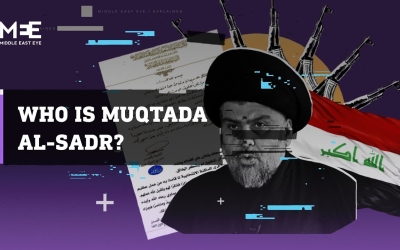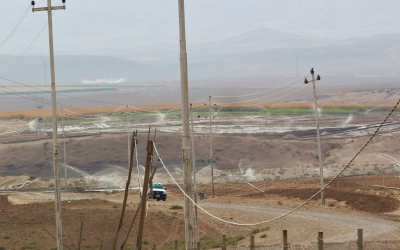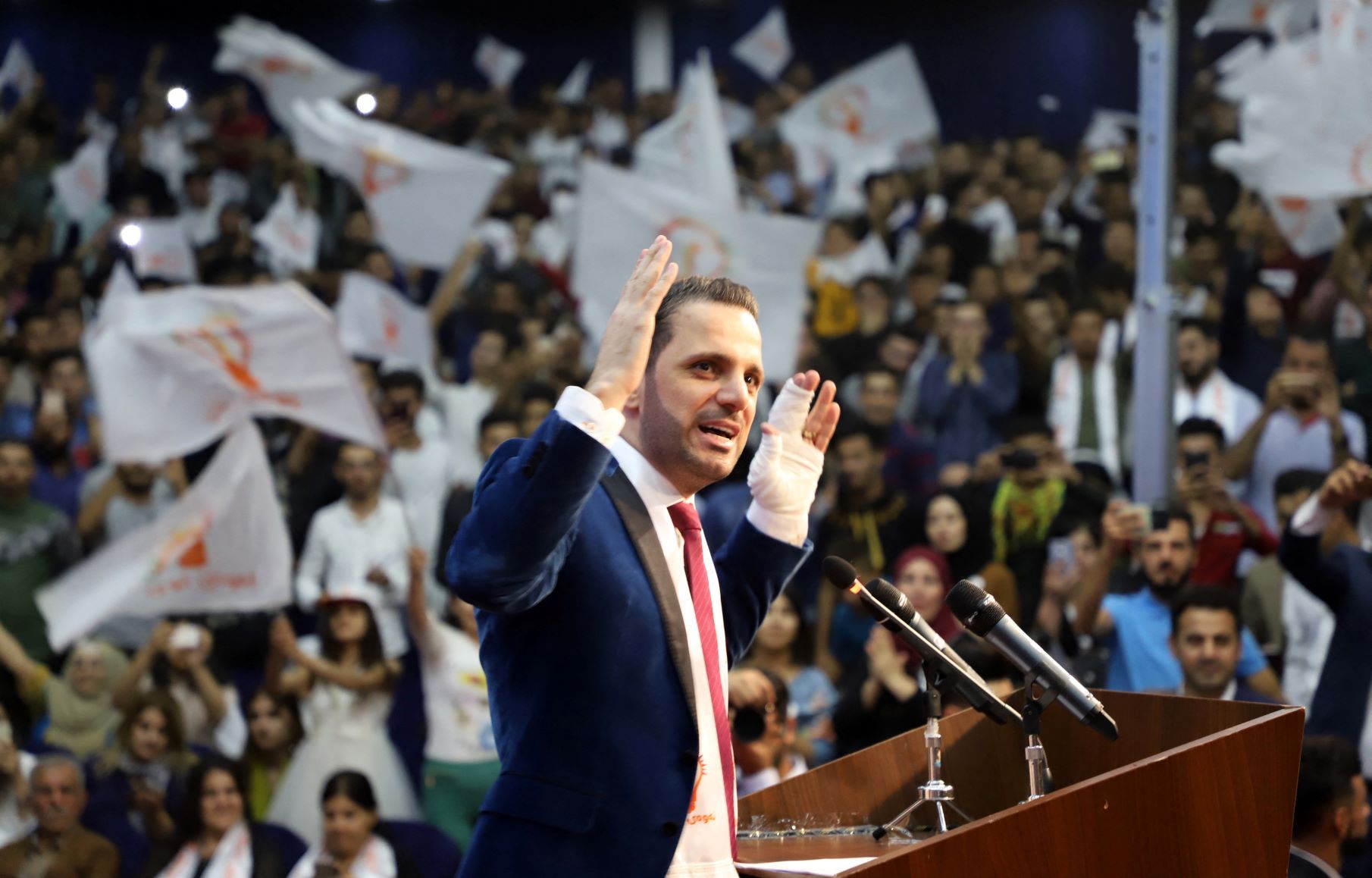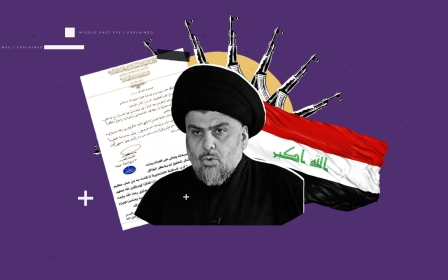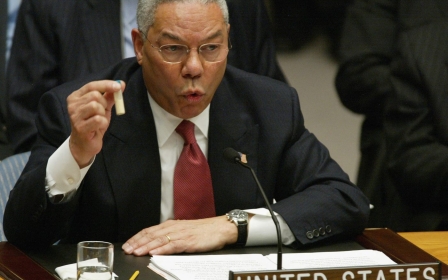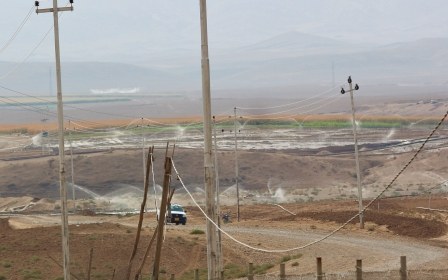Iraq: Rising star seeks to break grip of big families on Kurdish politics
Overlooking Sulaymaniyah, on the northern slope of the valley that contains what is often referred to as Iraq's most liberal city, is the mansion of businessman Shaswar Abdulwahid.
The Kurdish entrepreneur, property investor, owner of the Nalia Media Company, and founder of the New Generation party has emerged as arguably the most significant new player in the politics of Iraq's autonomous Kurdish region.
In the 10 October parliamentary elections, his party was able to more than double its number of seats from four to nine and establish itself as the third most-represented Kurdish party in the Iraqi parliament.
'We are talking about the future. You are talking about now'
- Shaswar Abdulwahid, New Generation
In doing so, the party has become the main challenger to the entrenched political power of the Kurdistan Democratic Party (KDP) and Patriotic Union of Kurdistan (PUK), who dominate the devolved Kurdistan Regional Government (KRG).
Sitting in an expanded pagoda in the garden of his home, his hand in a cast following surgery to help alleviate a chronic health condition, Abdulwahid told Middle East Eye that breaking the KDP-PUK hegemony was a long-term project.
New MEE newsletter: Jerusalem Dispatch
Sign up to get the latest insights and analysis on Israel-Palestine, alongside Turkey Unpacked and other MEE newsletters
"We are talking about the future. You are talking about now," he said.
"I've seen the future. I've seen the next 10 years, 15 years, 20 years, maybe... we think day after day if we stay on the same path and stay with the people, and the KDP and PUK stay on their own path - which is just corruption, money, companies - in a couple of years, or maybe the next five or 10 years, things will change."
Gorran movement obliterated
The KDP and PUK have dominated Iraqi Kurdish politics for decades. The former was founded in 1946 and the latter in 1975.
Originally, the centre-left PUK aimed to provide an alternative to the conservative, tribalistic politics of the KDP, which is dominated by the Barzani family, but eventually it too became largely a political vehicle for late former Iraq President Jalal Talabani and his family.
In 2009, angered with the entrenched corruption and tribalism in the party, veteran PUK politician Nawshirwan Mustafa formed the Gorran movement as a breakaway from the PUK, launching on a platform of opposing corruption and the entrenched power of the KDP and PUK.
However, in this month's elections, Gorran, following an election campaign dominated by Mustafa's sons and in coalition with the establishment PUK, was obliterated, losing all of its seats in parliament.
The leadership resigned a few days later, and Gorran said "a temporary body will be formed to govern the movement".
Meanwhile, New Generation, which was founded in 2017, also hails from the PUK stronghold of Sulaymaniyah and has made many of the same promises as Gorran, although Abdulwahid fiercely rejects any suggestion that his movement is simply yet another re-hash of Gorran.
"Gorran came from the beginning and said the same thing that we see from the opposition in every country, even in the US and the UK - they are looking for gaps, incorrect decisions from the government, and are talking about it," he argued.
Abdulwahid said that, in contrast, New Generation had been directly involved in a number of projects aimed at improving the lives of citizens.
"For example, when you come from Erbil to Sulaymaniyah, there is a bridge," he said.
"For three years, water was passing over the bridge. For three years, the prime minister, the deputy prime minister, everyone - two million people a year - they were going over this bridge and water was going inside the cars. And the government couldn't solve this problem.
"Me, because I'm an engineer, and New Generation - we [provided] them with a solution with $10,000 and we solved the issue.
"I know this is a small thing, but it's about the perspective, it's about the vision. It's about showing the people that the government cannot solve a problem of a bridge that the prime minister and deputy prime minister travel over, so how can they solve the other problems?"
Opposing independence 'for now'
Abdulwahid has been no stranger to controversy, and he has on several occasions faced repercussions for his stances.
In 2013, before he entered politics directly, he was the target of a drive-by shooting in which he was struck in the leg and had to be hospitalised.
The attack was presumed to be a response to coverage from his NRT TV news outlet, which regularly provides critical coverage of the KDP and PUK.
The offices have regularly been torched, threatened, and ransacked, not least after Abdulwahid came out as a public opponent of Kurdish independence.
In 2017, then-president of the KRG Massoud Barzani announced the holding of a referendum about whether to create an independent Kurdistan.
While the reaction from the majority of the Kurdish political class and media ranged from full-throated support to muted ambivalence, Abdulwahid launched the "No for Now" campaign, actively opposing secession, at least for the time being.
Economic perspective
It was a bold and highly controversial stance to take publicly and caused trouble for Abdulwahid, his allies, and the employees of NRT.
Though not an opponent of independence in principle, his campaign made the argument that the referendum had been called as a political ploy by Barzani and that the autonomous region was simply not stable, transparent, or economically self-sufficient enough to go for full statehood.
"It's had a bad impact," he said of the referendum, which eventually led to Baghdad recapturing a number of disputed territories, including the pivotal city of Kirkuk.
"Now there is no trust between Baghdad and the Kurdistan region, and we are losing $1bn a month because before Baghdad was sending $1bn a month."
In addition, he said, the referendum strained relations between the KRG and neighbouring Iran and Turkey.
"To be honest with you, my perspective of the issue is from the economic angle. The KDP's perspective is fighting from the mountains 50 years ago," he said.
"I think the best thing to happen for the people of the Kurdistan region and Iraq is to establish stability, and stability brings the growing of economic development. The development and businesses make the people more happy and leave a better economic situation."
Future prospects
Is it possible for New Generation to properly break the two-party establishment that has dominated Iraqi Kurdish politics since at least 1991, when the creation of a US no-fly zone allowed Kurds to establish a degree of genuine autonomy in the wake of Saddam Hussein's brutal massacres?
Both parties have long legacies fighting against the former Iraqi president and even his predecessors. Despite infighting, both have managed to hold their grip on their respective regions, even as governments and rulers have come and gone in Baghdad.
Some critics note that some of the practices that came to plague the original efforts of the PUK and Gorran to break with the region's tribalist politics have already reared their head in New Generation.
In 2019, a number of high-profile MPs very publicly criticised the party, accusing Abdulwahid of authoritarianism and nepotism.
Rabun Maroof and Sarkawt Shamsulddin, who were suspended following their public statement, said the party "no longer enjoys collective decision making" and criticised the appointment of Abdulwahid's sister, Sarwa, as head of party relations in Iraq.
Speaking to MEE, writer and analyst Kamal Chomani described Abdulwahid as a "populist, undemocratic sort of politician" who was intolerant of dissent, much like his antecedents.
"[He] has consolidated power within the party from the very beginning, including bringing into his circle only the people who never question and doubt any of his moves, including his sister," he said.
For his part, Abdulwahid would denounce the defections as a "repulsive game by both the KDP and PUK" to undermine the party.
New political blood
The 10 October elections have also been widely criticised for a record-low turnout, which saw the majority of Iraqis staying home.
According to figures from Iraq's Independent High Electoral Commission, the autonomous Kurdistan region did see one of the highest voter turnouts in the country, with a 54 percent turnout in Duhok province.
However, Sulaymaniyah province saw only a 37 percent turnout, and the Kurdish areas have clearly not been able to escape the widespread anger and contempt much of the Iraqi public feel for their country's political class.
Despite all this, the elections have seen a number of relative outsiders managing to raise their profiles.
'Don't do whatever the KDP and PUK do and you will be successful'
- Shaswar Abdulwahid, New Generation
The supporters of the Tishreen anti-government protest movement managed to enter parliament for the first time with Imtidad.
And despite his critics' misgivings, Abdulwahid believes that New Generation's success is also reflective of a desire for new political blood.
'Stay on the same path'
In a statement on 19 October, Abdulwahid said that his party would not be taking part in any negotiations for a new government and would be rejecting any ministerial positions.
"We don't want to take a ministry in Baghdad, we don't want to have a position in Baghdad to give us some shares [in power]," Abdulwahid told MEE.
"We are looking to build the future in Kurdistan, [it is] not about the money, or corruption or ministries in Baghdad."
He said the main campaign for his party going forward was aiming to be "number one" in the Kurdish region.
"Stay on the same path that we were on in the past three years - stay close to the people, not to money or ministries or interests," he said of his party's plans for the future.
"Think about [the people] not about yourself, don't think about how much you earn yourself because you have the Ministry of Oil."
"Don't do whatever the KDP and PUK do and you will be successful!"
Middle East Eye delivers independent and unrivalled coverage and analysis of the Middle East, North Africa and beyond. To learn more about republishing this content and the associated fees, please fill out this form. More about MEE can be found here.


